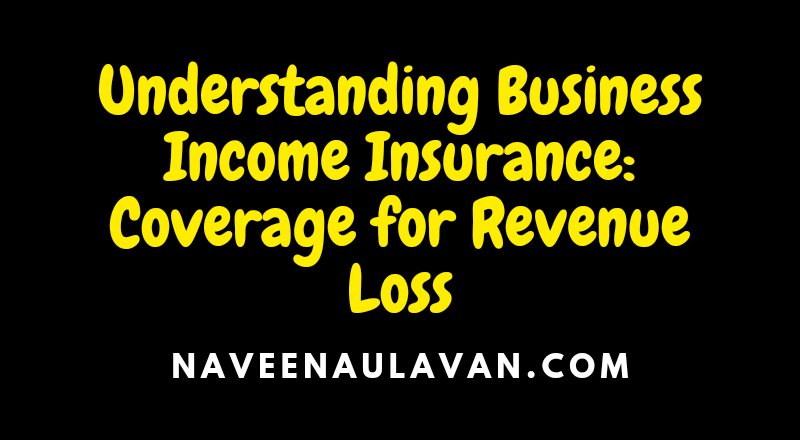Running a business involves a certain degree of risk and one of the most significant risks faced by business owners is the potential loss of revenue. Whether it’s due to a natural disaster fire or other unforeseen circumstances a disruption to a business’s operations can have severe financial consequences. Business income insurance is a type of coverage specifically designed to protect businesses from the financial impact of such situations. In this article we will delve into the details of business income insurance discussing what it covers how it works and why it is essential for businesses of all sizes.
Understanding Business Income Insurance
What is Business Income Insurance?
Business income insurance also referred to as business interruption insurance is a type of coverage that provides compensation for the loss of income a business experiences due to a covered incident. This insurance covers the revenue a business would have earned had the interruption not occurred. It is important to note that business income insurance is not a standalone policy but is typically included as an add-on to a commercial property insurance policy.
How Does Business Income Insurance Work?
When a business sustains a covered loss that leads to an interruption in its operations the business income insurance policy kicks in to provide financial relief. Here is a step-by-step overview of how business income insurance generally works:
1. Covered Incident
To trigger business income insurance coverage a covered incident must occur. These incidents can include natural disasters like hurricanes floods or earthquakes as well as human-made disasters such as fires vandalism or civil unrest. It is crucial to review the policy carefully to understand the specific perils covered.
2. Interruption Period
Once a covered incident occurs there will be an interruption period during which the business is unable to operate normally. This period is typically defined in the policy and can range from a few days to several months depending on the severity of the incident and the time required for the business to recover.
3. Loss Assessment
During the interruption period the business income insurance policy will cover the actual loss sustained by the business. This loss is determined by assessing the reduction in revenue compared to the business’s financial performance prior to the incident. It may also take into account additional expenses incurred to minimize the interruption’s impact or to facilitate the business’s recovery.
4. Compensation Calculation
The insurance company will typically calculate the compensation based on the business’s historical financial records including past income statements tax returns and other relevant financial documents. By evaluating these records the insurer can estimate what the business would have earned had the interruption not occurred.
5. Indemnity Period
The indemnity period is the duration for which the business income insurance policy will provide compensation. It begins from the date of the covered incident and extends until the business can reasonably resume normal operations or reach a predefined level of revenue. The length of the indemnity period should be carefully selected to account for the time needed for the business to recover fully.
Why is Business Income Insurance Important?
Revenue Protection
One of the primary reasons why business income insurance is crucial is revenue protection. When a business faces an unexpected interruption such as a fire destroying their premises they not only lose their physical assets but also suffer from a halt in income generation. Business income insurance mitigates this risk by providing compensation for the lost revenue ensuring that the business can continue to cover ongoing expenses and maintain financial stability during the recovery period.
Operating Expenses Coverage
During an interruption businesses may still have ongoing expenses such as rent utilities loan payments and employee salaries. Business income insurance can cover these operating expenses allowing businesses to meet their financial obligations even when their revenue is affected. This coverage helps prevent businesses from sinking into debt or being forced to shut down permanently due to an inability to cover their expenses.
Employee Retention and Morale
By having business income insurance in place businesses can retain their employees even during an interruption. With the insurance compensating for lost revenue and covering employee salaries businesses can provide a sense of security to their staff. This in turn helps maintain employee morale and loyalty as employees are reassured that their livelihoods are protected despite the temporary disruption.
Business Continuity and Recovery
The financial support provided by business income insurance enables businesses to focus on restoring their operations and recovering from the interruption. Whether it involves finding temporary workspaces replacing damaged equipment or rebuilding damaged facilities having the necessary financial resources can significantly expedite the recovery process. Business income insurance plays a crucial role in ensuring business continuity and minimizing the long-term impact of an interruption on a company’s operations.
Conclusion
Business income insurance is a vital component of risk management for any business. It provides financial protection against the loss of revenue caused by a covered incident such as a natural disaster or fire. By reimbursing businesses for their lost income and covering ongoing expenses this insurance helps maintain financial stability during an interruption and allows for a smoother recovery process. With business income insurance in place businesses can safeguard their revenue protect their employees and ensure their long-term viability even in the face of unforeseen circumstances.
